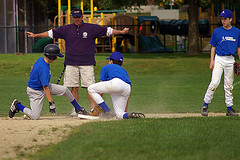 I usually come away from the NTC with one theme that is connected to multiple sessions. This year that learning theme for me was the importance of privacy and creating a safe space for communities to thrive.
I usually come away from the NTC with one theme that is connected to multiple sessions. This year that learning theme for me was the importance of privacy and creating a safe space for communities to thrive.
This first connection came up for me in the panel I organized on storytelling for movement building. Stacey Monk of Epic Change, Mark Horvath of Invisible People, and Estrella Rosenberg of Big Love, Little Hearts shared their perspectives on authentic storytelling from personal experiences. The conversation touched on how letting yourself be vulnerable to share your own story can give people in your community permission and courage to share their own important stories. This lead to a fabulous question about how to accomplish that when the issue is sensitive and people may face serious repercussions for being open about their experience publicly. Full transparency isn’t a luxury that everyone enjoys. For example, people experiencing domestic violence, workplace discrimination, or specific health issues are likely to think twice before publicly sharing their experiences.
 This conversation also led to a discussion about the role of anonymity in community and storytelling. For many organizations, such as advocacy groups working to fight against human trafficking, preserving the anonymity of those you seek to help is key - both to the success of your direct programming efforts in the field and to your ability to tell the story well. The darkened profile video interviews that some organizations use to meet this need for anonymity allow people to maintain their voices on an important issue without compromising their need for security and safety.
This conversation also led to a discussion about the role of anonymity in community and storytelling. For many organizations, such as advocacy groups working to fight against human trafficking, preserving the anonymity of those you seek to help is key - both to the success of your direct programming efforts in the field and to your ability to tell the story well. The darkened profile video interviews that some organizations use to meet this need for anonymity allow people to maintain their voices on an important issue without compromising their need for security and safety.
The importance of privacy in a community context surfaced again in the social media panel discussion that Frank Barry of Blackbaud led on Using Technology for Impact. After a question about the role of private social communities given the increasing dominance of Facebook, Twitter, and LinkedIn, two of the panelists, Beverly Robertson of the March of Dimes and Jessica Lazar of the American Lung Association, made a strong case for the continued importance of private communities. Both of their organizations maintain private social communities to accomplish their work. March of Dimes maintains a community for and online community for expectant mothers to ask health questions about their pregnancies and American Lung Association has had great success with its Freedom From Smoking Online community.
The panel, which also included Geoff Livingston of Zoetica and David Neff of Lights. Camera. Help. talked about the different community platforms available and the challenges of facilitating private online communities where staff vetting is required for entry in order to preserve members safety and ability to talk frankly about the challenges they are facing. There were a lot of other great takeaways from this session and I encourage you check out the recording in the Online NTC if you missed it live, but the consensus from the panel was pretty clear. Private nonprofit online communities are here to stay so long as people continue to struggle with sensitive issues where privacy is key.
Over to You
How do you face this challenge? How are you creating safe space for your supporters to share their experience? Please share what you’ve learned with us in the comments.
Photo Credit: Paul-W
*Avi Kaplan is the Online Coordinator, AKA Coordinator of Awesomeness, at Rad Campaign, a firm that provides web design, web development and online marketing and strategy to nonprofit organizations and political campaigns.


COMMENTS